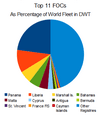Flag of convenience facts for kids
A flag of convenience (often called FOC) is a special way a ship can be registered. Every ship needs to be officially registered in a port or country. This registration is like giving the ship a nationality. The laws of that country then apply to the ship, its crew, and how it operates.
Some countries have rules that are less strict or cheaper for ship owners. Because of this, many ship owners from one country might choose to register their ships in another country that offers these easier or cheaper options. Even if the ship never visits that country, it must fly the flag of the country where it is registered. This is what we call a flag of convenience. Some of the most popular countries for flags of convenience include Panama, the Marshall Islands, and Liberia.
Contents
Why Ships Need a Flag
Every ship in the world must be registered with a country. This is like a car needing a license plate and registration. The country where a ship is registered is called its "flag state." This flag state is responsible for making sure the ship follows international rules.
The flag state's laws cover many things. These include how safe the ship is, the working conditions for the crew, and how the ship affects the environment. It also helps identify the ship if there are any problems or accidents at sea.
How Flags of Convenience Work
Ship owners choose a flag of convenience for several reasons. The main reasons are often to save money and to have more flexibility.
Saving Money
Registering a ship in some countries can be much cheaper. These countries might have lower taxes or fewer fees. This means ship owners pay less to keep their vessels registered.
Less Strict Rules
Some flag states have less strict rules about how ships are built, maintained, or operated. They might also have fewer rules about the wages or working conditions for the crew. This can make it easier and cheaper for ship owners to run their businesses.
For example, a country might not require as many safety checks. Or, it might allow ship owners to pay lower salaries to their crew members.
Popular Flags of Convenience
Several countries are well-known for offering flags of convenience. These countries attract many ship owners from all over the world.
- Panama: This country has one of the largest ship registries in the world. Many ships fly the Panamanian flag.
- Liberia: This African country also has a very large number of ships registered under its flag.
- Marshall Islands: These islands in the Pacific Ocean are another popular choice for ship registration.
These countries often have simple registration processes. They also have laws that are favorable to ship owners.
Concerns About Flags of Convenience
While flags of convenience offer benefits to ship owners, they also raise some concerns.
Safety and Environment
When rules are less strict, there can be worries about safety. Ships might not be maintained as well. This could lead to accidents or pollution. For example, the sinking of the Amoco Cadiz oil tanker in 1978, which caused a huge oil spill, led to more inspections of ships by port states.
Crew Rights
Workers on ships flying flags of convenience might have fewer protections. Their wages could be lower, and their working conditions might not be as good. This is because the laws of the flag state might not protect workers as strongly as other countries.
International Monitoring
International organizations like the International Transport Workers' Federation (ITF) try to monitor ships with flags of convenience. They work to improve safety and working conditions for seafarers.
Images for kids
-
MOL Pride, owned and operated by the Japanese company Mitsui O.S.K. Lines, flying the flag of Liberia and home-ported in its capital, Monrovia.
-
MV Mainport Pine, a seismic support vessel owned by Irish company Mainport Group, flies the flag of the Marshall Islands and bears the home port of Majuro.
-
The engineers of the Seamen's Act, from left to right, maritime labor leader Andrew Furuseth, Senator Robert La Follette, and muckraker Lincoln Steffens, circa 1915
See also
 In Spanish: Pabellón de conveniencia para niños
In Spanish: Pabellón de conveniencia para niños
 | Bessie Coleman |
 | Spann Watson |
 | Jill E. Brown |
 | Sherman W. White |






